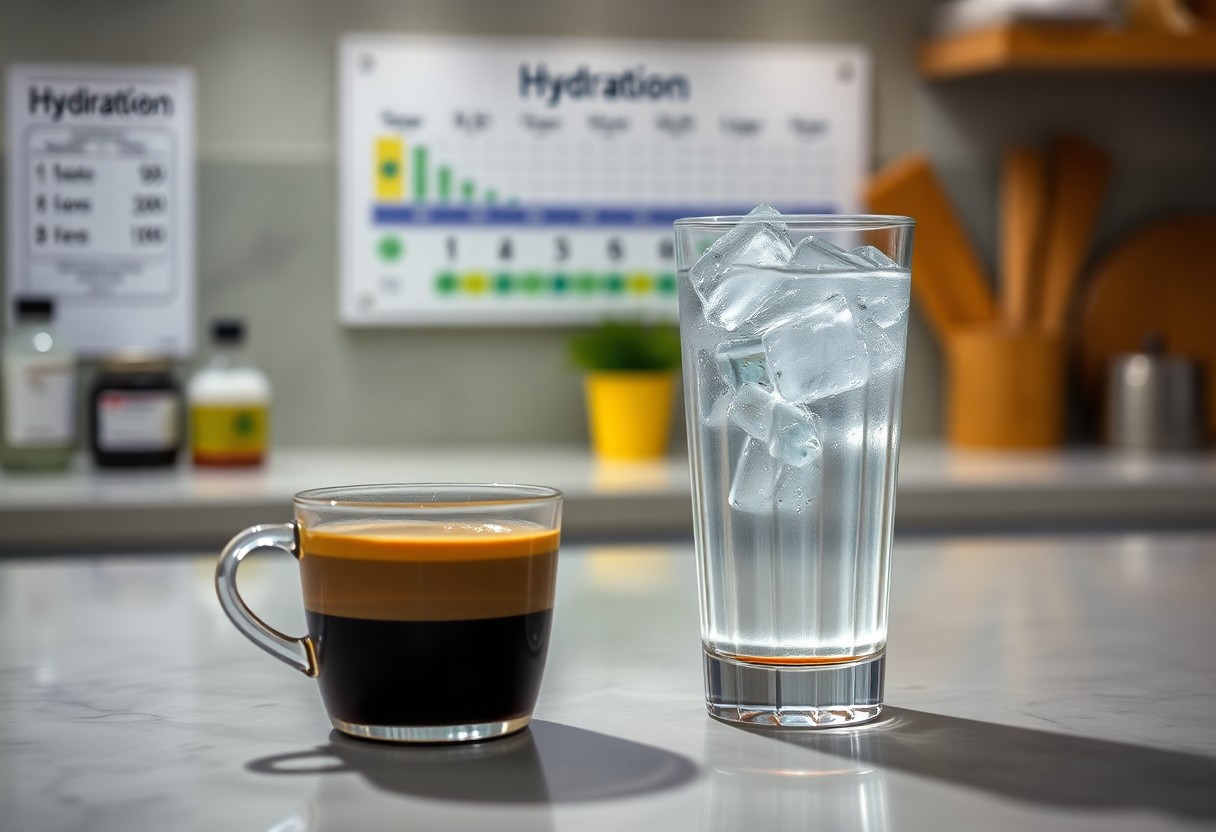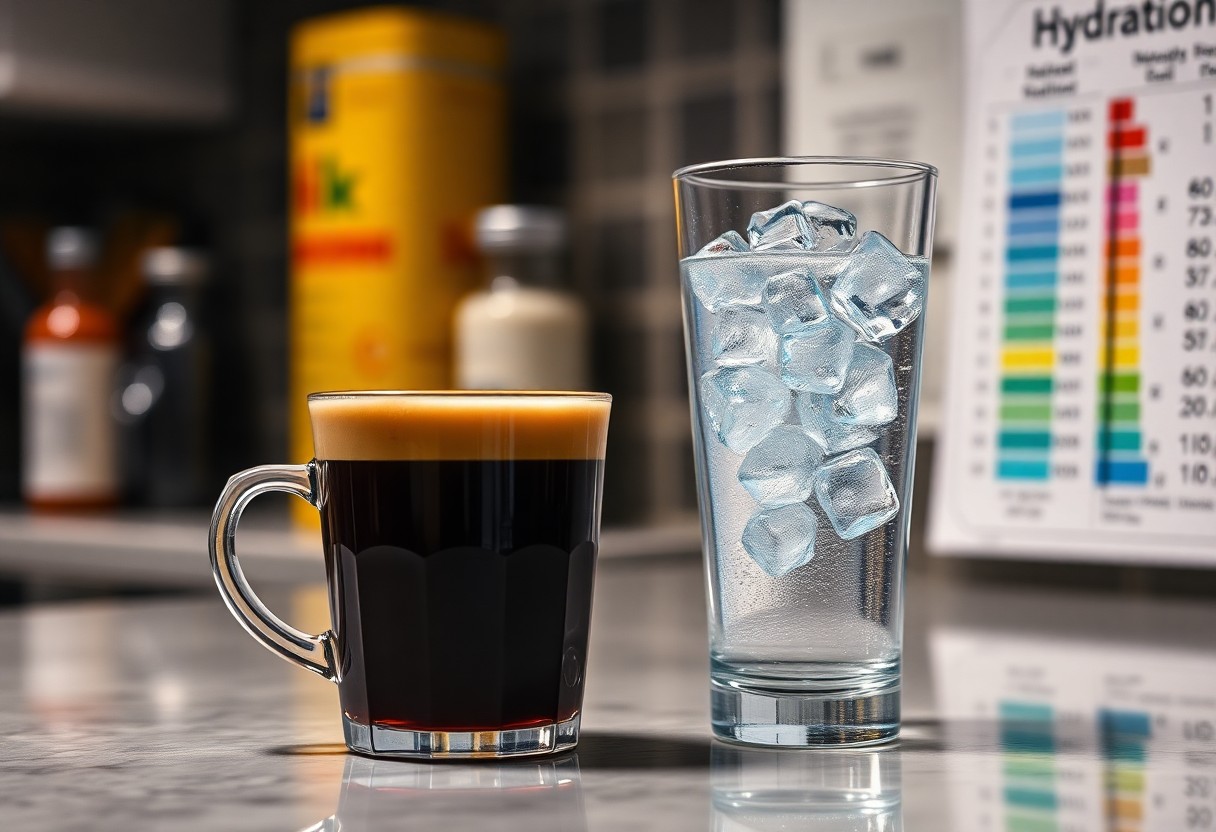With the rising popularity of coffee, you may wonder if it affects your hydration levels. While it’s commonly believed that consuming coffee leads to dehydration, research shows that this notion is largely a myth. In fact, moderate coffee consumption can contribute to your daily fluid intake, helping maintain your body’s water balance. Understanding the interplay between coffee and hydration can help you enjoy your favorite brew without the fear of compromising your health. Let’s investigate into the facts and separate the myth from reality.
Key Takeaways:
- Coffee does not significantly contribute to dehydration; it can be part of your daily fluid intake.
- The diuretic effect of caffeine is often overstated; your body adapts to regular coffee consumption.
- Overall hydration comes from various sources, and coffee can contribute positively to your body’s water balance.

The Caffeine Conundrum: Myths vs. Facts
The Origin of the Hydration Myth
The perception that coffee dehydrates stems largely from its caffeine content. Early studies suggested that caffeine could lead to increased urine output, suggesting a diuretic effect. However, these findings were often misinterpreted or exaggerated, leading to a widespread belief that coffee contributes to dehydration. The origin of this myth can be traced back to a limited understanding of how diuretics work in relation to overall hydration.
What Research Really Says About Coffee and Hydration
Current research indicates that coffee can indeed contribute to your daily hydration needs. Studies show that the diuretic effects of caffeine are mild and usually do not outweigh the hydration benefits of the fluids consumed. For example, a 2014 study published in the journal *PLOS ONE* found that moderate coffee consumption had no significant impact on hydration status compared to water.
A detailed view into the research reveals that coffee’s hydrating effects are more pronounced than once thought. In a study where participants consumed varying amounts of coffee, their hydration levels remained stable, demonstrating that the body adapts efficiently to caffeine intake. The body treats the fluids in coffee similarly to other beverages, ultimately suggesting that java lovers need not worry about excess caffeine compromising hydration. Most studies now affirm that moderate coffee consumption can actually be part of your healthy hydration strategy, reinforcing that enjoying your coffee does not inherently endanger your water balance.
The Balance Equation: Water Needs vs. Coffee Consumption
Balancing your body’s water requirements with coffee consumption can seem complex, but it’s manageable with a little understanding. Your individual hydration needs can vary greatly based on factors such as activity level, climate, and overall health. When you’ve got coffee as part of your daily routine, it’s imperative to consider its role within the broader context of your fluid consumption.
Daily Hydration Recommendations
The general guideline for daily water intake suggests aiming for about 3.7 liters for men and 2.7 liters for women, accounting for all beverages and food. However, individual needs may differ, especially if you’re physically active or live in a hotter climate. Monitoring your thirst and urine color can be useful indicators of your hydration status.
How Coffee Fits into Your Daily Fluid Intake
Surprisingly, coffee contributes positively towards your daily fluid goals. Studies indicate that up to 400 mg of caffeine daily, roughly equivalent to four 8-ounce cups of coffee, does not cause dehydration. Instead, the liquid from coffee is counted as part of your total fluid intake, helping you to maintain hydration levels.
Interestingly, while some believe that caffeine leads to rapid dehydration, research shows that coffee can still benefit hydration, thanks to its high water content. In fact, coffee consumes significantly less than you might think; for instance, a standard 8-ounce cup of brewed coffee contains about 95% water. This effectively means that for each cup you drink, you’re contributing to your overall fluid balance. Consequently, enjoying your daily coffee can actually enhance your hydration rather than detract from it, so you can savor that warm cup guilt-free.

Coffee’s Role in Diuresis: The Science Explained
Understanding Diuretic Effects
Caffeine is often labeled as a diuretic, meaning it can increase urine production. This effect occurs because caffeine inhibits the reabsorption of sodium in the kidneys, leading to greater fluid loss. Studies have shown that even moderate caffeine consumption can elevate urine output in individuals not regularly consuming caffeine. However, the diuretic effect tends to diminish in habitual coffee drinkers due to their increased tolerance.
The Real Impact on Fluid Levels
Surprisingly, the overall impact of caffeine consumption on your body’s hydration status is less dramatic than commonly believed. While coffee does promote some diuresis, the amount of fluid you consume in coffee generally offsets this effect. A 2014 study published in the American Journal of Clinical Nutrition indicated that moderate coffee drinkers maintain hydration levels similar to non-coffee drinkers due to their total daily fluid intake. In essence, while coffee might cause you to urinate more frequently, the water content in each cup supports your hydration needs.
This means that if you consume coffee in moderation, you can confidently enjoy its flavor and aroma without significantly compromising your body’s hydration balance. For instance, a standard 8-ounce cup of coffee contains roughly 95 milligrams of caffeine and about 95% water, contributing to your daily fluid intake. As such, the diuretic effects of coffee need to be balanced with the fluid contribution of the beverage itself, making it more hydrating than dehydrating overall.
Beyond Hydration: Coffee’s Health Benefits
Exploring coffee’s impact extends well beyond hydration. This beloved beverage is packed with valuable nutrients and compounds that can benefit your overall health, making it more than just a source of energy. Regular coffee consumption has been linked to a range of positive effects, from improved mental clarity to enhanced physical performance. Evidence suggests that coffee may play a role in reducing the risk of certain diseases, supporting your body in various ways while still keeping your hydration levels in check.
Antioxidants and Other Nutrients
Coffee is a significant source of antioxidants, which help combat oxidative stress in your body. These compounds, including chlorogenic acids, can reduce inflammation and safeguard against chronic illnesses. Beyond antioxidants, coffee contains crucial nutrients like B vitamins, potassium, and magnesium, fueling your body and maintaining its overall health.
Cognitive Function and Physical Performance
Research has shown that coffee can significantly enhance cognitive function and may improve physical performance. The caffeine in coffee acts as a stimulant, increasing alertness and focus, while also improving reaction time and endurance during workouts. Studies indicate that consuming caffeine close to a workout can lead to better performance across various physical activities, from weightlifting to endurance sports.
The benefits of caffeine for cognitive function are backed by research demonstrating improved memory, attention span, and mood enhancement after consumption. You might experience a noticeable boost in your ability to stay focused during tasks, as caffeine prompts the release of neurotransmitters like dopamine and norepinephrine. Physically, caffeinated coffee can enhance your endurance by increasing adrenaline levels and promoting faster fat utilization during exercise, enabling you to push through challenging workouts more effectively. These effects illustrate why many athletes rely on coffee as a pre-workout boost to sharpen both their minds and bodies.
Practical Tips for Staying Hydrated While Enjoying Coffee
You can enjoy your coffee while still prioritizing your hydration. Pairing your morning mug with water can mitigate potential dehydration effects. Consider these tips for maintaining a healthy water balance while savoring your favorite brew:
- Drink a full glass of water before your first cup of coffee.
- Alternate between sips of coffee and water during your breaks.
- Incorporate hydrating foods like fruits and veggies into your meals.
- Limit coffee to short periods and focus on herbal teas or decaf options later in the day.
The ultimate goal is to enjoy your coffee without compromising your overall hydration.
Complementary Hydration Strategies
Incorporating complementary hydration strategies can enhance your overall fluid intake throughout the day. Including electrolyte-rich beverages or adding a splash of citrus to your water can make hydration more appealing. Snacks like cucumbers, oranges, and watermelon not only help keep your body hydrated but also provide important vitamins and minerals that support your health. Every addition counts towards achieving your hydration goals.
Balancing Coffee Consumption with Water Intake
A conscious strategy allows you to enjoy coffee while staying hydrated. For every cup of coffee you consume, aim to drink an additional 8 ounces of water. This simple ratio can help offset the mild diuretic effects of caffeine and maintain your body’s overall fluid balance. Coffee can still be a part of your daily routine, as long as you adjust your fluid intake accordingly.
Balancing coffee with water intake is more than just a strategy; it’s about enhancing your daily experience. If you start your day with that vibrant cup, make it a habit to chase it with water. Listen to your body—if you’re sipping coffee in the afternoon or evening, consider drinking water alongside to ensure your hydration levels remain optimal. Ultimately, staying aware of both your coffee consumption and your hydration habits will create a smoother, more enjoyable daily rhythm.
Summing up
To wrap up, understanding the relationship between coffee and your body’s hydration can help you make informed choices about your beverage consumption. While coffee does have a mild diuretic effect, research shows that it does not significantly dehydrate you. In fact, the fluids you consume from coffee can contribute to your overall hydration status. So enjoy your coffee without guilt, knowing that it can be a part of your daily fluid intake and won’t hinder your water balance.
FAQ
Q: Does coffee contribute to my daily hydration needs?
A: Yes, coffee can contribute to your hydration levels. While it contains caffeine, which has a mild diuretic effect, research indicates that the overall hydrating properties of coffee outweigh this effect. Studies have shown that moderate coffee consumption does not lead to significant fluid loss and can be considered part of your daily water intake.
Q: How does caffeine in coffee affect dehydration?
A: Caffeine does have mild diuretic properties, which can cause increased urine production. However, the diuretic effect is less pronounced in regular coffee drinkers due to tolerance. For most people, moderate consumption of caffeinated beverages like coffee does not lead to dehydration, especially when consumed as part of a balanced diet.
Q: Can drinking coffee replace water in my diet?
A: While coffee does contribute to overall fluid intake, it should not entirely replace water in your diet. Water is vital for many bodily functions and is the best choice for hydration. It’s ideal to balance your fluid intake by including both water and other beverages like coffee to ensure you meet your hydration needs without solely relying on caffeine.
Q: How much coffee is considered safe for hydration purposes?
A: For most people, consuming 3 to 4 cups of coffee per day is considered safe and can fit well into a hydration strategy. The key is to listen to your body and observe how it reacts to caffeine. Individual tolerance to caffeine varies, so moderation is vital to avoid potential side effects like jitteriness or insomnia.
Q: What other beverages can support hydration besides water and coffee?
A: In addition to water and coffee, beverages such as herbal teas, decaffeinated drinks, and even fruits and vegetables with high water content support hydration. Drinks like coconut water and milk also provide hydration benefits. It’s beneficial to incorporate a variety of fluids and foods to maintain optimal hydration levels throughout the day.
